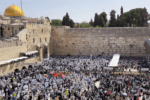You may be wondering just exactly what the Pharaoh in the church is. The spirit of Pharaoh that must be uprooted is revealed in a powerful line from a worship song by Brian Ming:
“Forgive us for building man’s kingdoms on doctrines of demons in Your name.”
There it is. Due to a great lack of understanding and trust of God and his process, it has become acceptable to use people to build religious systems. Pastors have often unwittingly taken on the mantle of Pharaoh as they advance their vision to develop their kingdom instead of leading the body into the burning presence of God in the wilderness of encounter. Again, much of what happens has benefited people.
In fact, the development of excellent programs and ministries have both benefited people (to a degree) and built man’s kingdom. They have even, to a degree, built God’s kingdom. It’s not always all bad or all good. There is some mixture. But the call to minister to God in the desert will require a degree of trust that is rare today. We’ll discuss this further, but for now understand this: we must drop our bricks, rediscover our identity and follow God’s ordained leadership into the wilderness of encounter.
There is both a spirit of bondage and a spirit of Pharaoh upon the church. In Egypt, the Hebrews’ very identity was based on their ability to produce—to make bricks and build the kingdom. Similarly, the church has become comfortable in learning how to make bricks; our identity is founded on how we can fit in the body, how we are received and what we can produce.
This focus is self-serving, and it can easily cause us to resist the call of God to change. This change will greatly affect both the body and the leadership—but it is at its core a trust and obedience issue. Does the body trust God’s wisdom in placing us under our authority? Does the leader trust God’s call to release and lead the people into a place of encounter?
This is a call of release from making the bricks that are used in building the kingdoms of man. It’s an issue of trust as we see the body released into a place of intercession and ministry in the fire of God’s presence. It’s a great transition from a human system into a system of God that will lead us into the wilderness of encounter. Churches must at their very core be prayer-fueled, encounter-driven ministries unto God.
The goal should be for people to tremble and collapse under the weight of the glory of God as they walk up to the church building! In 2 Chronicles 7 they couldn’t even enter the building! They all hit the pavement as the glory of God consumed the place. That should be our church growth strategy today! It’s time to discover the fire and glory again.
We must understand that it’s time to stop trying to become expert brick makers and start following the voice of the Lord! There is no need for bricks where God is leading the church!
The church must become responsive to the prophetic voice of God to put down the bricks and to move out! There are tents to be set up, directions to be received, rivers to be crossed and cities to be taken! In order for this to happen, we first must move from our current position and step into the great unknown. God has mighty plans to blow our minds, and we have to trust that He’s very good at leading us into that brand new place.
The current system that is being threatened with reformation from Heaven is one that survives by using. Pastors and leaders must take notice. We must repent. We have marketed and sold our church experiences. We have been mindful of man ahead of God.
The day has come where instead of convincing our communities that we have the best children’s ministry and the most progressive worship and the nicest sanctuary and the best way to connect with others we will actually announce the severity of the call!
When people join our churches, they must find themselves in the wilderness of encounter from day one! The bar will be raised high, the cost is everything they have, holiness is non-negotiable and an extreme lifestyle of prayer IS the experience! When the fire of intercession burns the flesh of those who wander into our meetings, you will witness a deep and dramatic conversion of desperate souls.
And, yes, it’s true; many won’t come. The tithes might be low. Pastors’ reputations will be at risk. Pride will take a mighty blow. Buildings may not be built. People will complain. You see, in Egypt it’s all about the desire of Pharaoh to build a kingdom. In the wilderness, control over the people is surrendered, and the only acceptable plan is to lead them into God’s presence. Pastors, we must let the people go and lead them into the tent of meeting where God Himself burns night and day.
As I write this, tears are trying to form in my eyes. I’m quite undone. A violent groan is in my spirit. The call of the Lord is:
“NOW, NOW, NOW! The remnant, the hungry, the broken—step into position, stand up with a great burning within, a wellspring of tears pouring out, with your cross crushing your back … stand up and prepare to march. NOW, NOW, NOW! Change, change, change! I am coming! I am moving! I am moving! NOW, NOW, NOW!”
I feel we must be willing to risk losing everything for the sake of reformation. Recalling again that life-altering moment at a dark, lonely altar at Revolution Church, I said, “God, if we do this, I’ll lose my reputation.” As a dreamer, leader and visionary, I had an all-encompassing passion to fulfill my mission. People would certainly presume that I had missed God if I shifted gears so severely. They’d think I was confused. I was dropping the ball. But, of course, Jesus was of no reputation. It’s not about who we are; it’s about whom we represent.
Are we willing to risk everything for the sake of offensive, shaking, cross-centered revival that puts an end to much of what we have held dear? Will we move our churches into a place that may result in great personal loss? Will we be willing to lose our retirement, our health insurance, our salaries and our comforts? Friend, momentous change is coming. It’s a reformation. It’s a revolution.
The Egyptian System
The spirit of Pharaoh will use every tactic to keep the current structure in place and will resist the release of people and resources even if it means it will move the people closer to God.
Let me shout this with clarity—we must repent for, either intentionally or subconsciously, considering the growth of the church ahead of the call to lead people into God’s presence!
We need to soberly understand that God is removing leaders who lead with the spirit of Pharaoh and is raising up those who declare without apology the current directive of the Lord.
Church, pastors, leaders, this is where we are now—God has come down to see what has been built, just as he did with the Tower of Babel, and he’s about to act.
Let me make a very important point—I am not saying that the old structure is fully and comprehensively evil—no way. Just as Moses himself lived in the Egyptian system and started to lead God’s people by defending them from the abuse of the slave drivers, there are leaders now who know nothing but the current church system and have a great heart for God’s people.
However, if we refuse to release the current structure, and the people of the Lord for what is next on God’s agenda, our evil intentions will be riled up and exposed. We must be humble, broken, alert and responsive. We must resign our positions and opinions daily and refuse to hold on to anything too tightly.
“And Pharaoh said, “Who is the LORD, that I should obey His voice to let Israel go? I do not know the LORD, nor will I let Israel go” (Ex. 5:2).
This spirit of Pharaoh has gripped the church. This is evidenced in the alignment with Pharaoh’s statement—I don’t receive the word of transition. I don’t acknowledge that God is saying anything. I will not release my project of building what I’ve been working on for years.
As in other transitional periods throughout biblical history, the word of change resulted in hardened hearts instead of obedience. The current structure as we know it must be left entirely, and those who have anything to lose in that process will be tempted to fight the change.
“So they said, “The God of the Hebrews has met with us. Please, let us go three days’ journey into the desert and sacrifice to the LORD our God, lest He fall upon us with pestilence or with the sword” (Ex. 5:3).
God is raising up prophetic men and women, messengers to sound the alarm, to call the church into reformation. The declaration is clear—let the people go!
Note that the call is not simply to step outside the gates of the kingdom, but rather to travel a day’s journey. It’s a call far away from the current structure.
“Then the king of Egypt said to them, “Moses and Aaron, why do you take the people from their work? Get back to your labor” (Ex. 5:4).
Pharaoh became irritated at the first threat of the structure being disrupted. Allow me to boldly ask you to examine your own heart. A spirit of Pharaoh in a leader can often be evidenced through a resistance to the call of God for change. Pharaoh’s very identity was wrapped up in the development of Egypt. Any thought of risk to that identity was not even an option.
For those who align with this spirit, the prophetic call to change will be rejected, then mocked and then become a cause of great irritation.
“And Pharaoh said, “Look, the people of the land are many now, and you make them rest from their labor!” So the same day Pharaoh commanded the taskmasters of the people and their officers, saying, “You shall no longer give the people straw to make brick as before. Let them go and gather straw for themselves. And you shall lay on them the quota of bricks which they made before. You shall not reduce it. For they are idle; therefore they cry out, saying, ‘Let us go and sacrifice to our God.’ Let more work be laid on the men, that they may labor in it, and let them not regard false words.” And the taskmasters of the people and their officers went out and spoke to the people, saying, “Thus says Pharaoh: ‘I will not give you straw. Go, get yourselves straw where you can find it; yet none of your work will be reduced'” (Ex. 5:5-11).
The tension will certainly be extreme as the prophetic mandate for reformation hits a spirit that’s intent on staying the course of his kingdom-building plans.
This may be another good spot to bring some clarity to the point I’m trying to convey. I believe that the spirit of Pharaoh is something that every leader must contend with. I am by no means saying that the leaders I am writing this message to are evil, as we know Pharaoh was.
This issue can affect the most amazing, zealous and surrendered servant-leaders in the kingdom of God. The reality is that, in our Western, American culture, the pressure to succeed in the minds of men is extreme. Pastor’s salaries, reputations, security, retirement, stability in their own families and so many other factors are a part of this wide-reaching drama. All of that and much more is at risk. I understand that embracing an Egyptian building blueprint has loads of benefits and it may be the hardest thing you’ve ever done if and when you break this model of ministry off of your church.
In the story we see that Pharaoh is greatly irritated, and his response is to highlight his control over his people and his kingdom. Not only will he not relent, he proves that he is in charge and increases the demands on the Israelites.
“So the people were scattered abroad throughout all the land of Egypt to gather stubble instead of straw. And the taskmasters forced them to hurry, saying, ‘Fulfill your work, your daily quota, as when there was straw.’ Also the officers of the children of Israel, whom Pharaoh’s taskmasters had set over them, were beaten and were asked, ‘Why have you not fulfilled your task in making brick both yesterday and today, as before?'” (Ex. 5:12-14).
As the hope for freedom draws near, the enemy, Pharaoh, raises his head and strikes. More production with less resources is demanded, and the result is a mandate that can’t be obeyed. Unholy judgment comes and increases the fear and bondage of the people.
Pressure From Both Sides
OK, are you ready? Can the pressure possibly get any greater? By now we realize the move from Egypt to the wilderness of encounter is going to be possibly the most difficult thing we’ve ever done. The fear and anger and tension is already quite extreme at this point of the story, but it’s about to be increased. Now both Pharaoh and the Hebrews resist!
“Then, as they came out from Pharaoh, they met Moses and Aaron who stood there to meet them. And they said to them, ‘Let the LORD look on you and judge, because you have made us abhorrent in the sight of Pharaoh and in the sight of his servants, to put a sword in their hand to kill us'” (Ex. 5:20-21).
The complaints against Moses were flying! Why? Suddenly, this movement toward freedom resulted in life becoming worse, not better than it was before. Rather than being mission minded, they were focused on their own comfort level. It’s the epitome of self-centeredness! Instead of agreeing with the call for the masses to experience freedom, instead of having a heart for our children who have an opportunity to be free from Pharaoh’s curse, the selfish cry for personal preservation resounds.
Leaders, get ready. When the word for change comes, the cries will begin to sound!
“I want this and that. This is NOT what I signed up for! Let me tell you how things are supposed to be!”
Wiersbe Expository Outlines reveals: Believers who are out of fellowship with God bring grief to their leaders instead of help.
Prophetic leadership by its very nature will attempt to lead people into the invisible realm, into the unknown. In the face of certain resistance, we must pray for agreement as God gives us the directions for the journey into the unknown and challenging place of discovery.
Those leaders who take on the mantle of Moses and press against the spirit of Pharaoh, will not only have that spirit to deal with. They can also expect to be attacked by the very people they are called to lead to freedom!
You see, the Egyptian system is a place of bondage, but it’s also a place of safety and comfort—if you follow the rules. As the captives are being led from chains to the very presence of God, their discomfort will be more than most feel they can bear. Don’t be surprised if most members of your church choose to remain in an Egyptian system when you attempt to lead them into freedom.
It will be all too easy for them to leave your church and find another that reminds them of the “good old days.” Do you remember the cry of the Israelites after they made it to the wilderness? They complained and wanted to return to Egypt. Truly, this call out of Egypt is extreme and costly. The message of comfort and safety must be replaced with the kingdom message of advance!
This issue is a key reason why most leaders refuse to move the people into the primary focus of fervent prayer and intimacy with God. People will leave. They will take their money with them, and reputations will be lost.
When a prophetic word is given, the one delivering it will usually feel very alone and opposed by all sides—by the enemy and by those he is leading into freedom.
Noah was alone, Elijah cried out after his greatest victory that he was alone, Jonah was rejected by those on the boat who were concerned for their own lives, John the Baptist was murdered, and on and on.
If we are going to partner with God and be a mouthpiece for his prophetic word to the current system and culture, we better be prepared to stand alone for a season.
“And there he went into a cave, and spent the night in that place; and behold, the word of the Lord came to him, and He said to him, ‘What are you doing here, Elijah?’ So he said, ‘I have been very zealous for the Lord God of hosts; for the children of Israel have forsaken Your covenant, torn down Your altars, and killed Your prophets with the sword. I alone am left; and they seek to take my life'” (1 Kin. 19:9-10).
Yet, we are not alone.
“Yet I have reserved seven thousand in Israel, all whose knees have not bowed to Baal, and every mouth that has not kissed him” (1 Kin. 19:18).
Tune in Friday for Part 3 of this series; click here for part one. This excerpt, the second in a three-part series, is taken from John Burton’s book Pharaoh in the Church, the follow up to Covens in the Church. (Covens in the Church is a message about the body’s responsibility to submit to authority and Pharaoh in the Church is a message calling leaders to stop using people to build their own kingdom).
John Burton has been developing and leading ministries for over 25 years and is a sought-out teacher, prophetic messenger and revivalist. John has authored ten books, has appeared on Christian television and radio and directed one of the primary internships at a major international prayer ministry. Additionally, he planted two churches, has initiated two city prayer movements and is currently directing an online prayer and revival focused ministry school called the School of Revival. John also produces prophetic equipping media that can be watched or listened to most every day at thefurnace.tv.
He and his beautiful wife Amy have five children and currently live in the Branson, Missouri, region. John is available to minister anywhere in the world and can be contacted via his site at johnburton.net.







Leave a Comment
You must be logged in to post a comment.